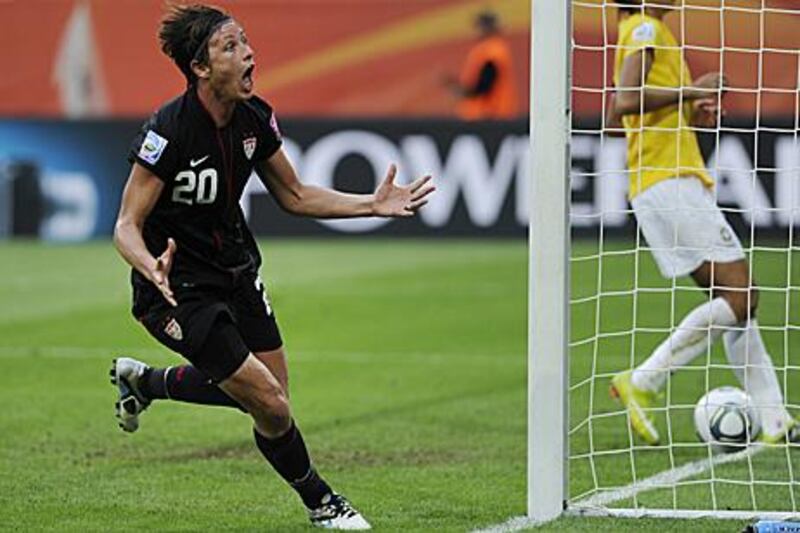Twelve summers ago, the US won their first women's World Cup.
It was a sporting equivalent of mankind's first walk on the moon. Meaning, just as subsequent strolls on the lunar surface could never thrill as much as the original, America's female football team could not hope to again party like it was 1999.
More than an addition to the trophy case, the World Cup was the payoff from Title IX, a US law passed nearly four decades ago that promised comparable federal funding for both sexes in educational programmes.
The legislation impacted on athletics, and it has played no small part in increasing the percentage of girls engaged in high school sports from seven to 41.
If an achievement can be measured by an indelible image, the 1999 World Cup had a doozy: Brandi Chastain scoring the penalty shoot-out goal that disposed of China for the championship, then ripping off her jersey and sliding on the grass.
She became a heroine to her gender and cleared up a few mysteries for the other one.
• So women, the same as men, can develop sinewy bodies through fitness and weight training?
• So that's what a sports bra looks like?
This Sunday past, with the first kick of the US versus Brazil game, nobody without a crystal ball could have imagined a legitimate sequel to 1999, another awesome moon walk.
After all, this was a quarter-final. The opponents were formidable and star-studded, with the magical Marta, but never champions in the five previous World Cups.
For nearly two-thirds through the 90 minutes, it was more clunker than classic. The US led 1-0 thanks to a careless own goal before anyone broke a sweat, and neither side was flashing much aggression.
In a blink, it all changed. The referee, Jacqui Melksham, awarded Brazil a penalty, based on one of the hard-to-fathom rules in football that keep it from wider acceptance in America. Melksham then compounded her call by red-carding the offender, Rachel Buehler, a double whammy for the US. By the laws of the game, Melksham had to send off Buehler as she was the last defender, but the decision to award the penalty was iffy to say the least.
The obligatory red card is a baffling rule too, analogous to jailing someone for a minor offence, then starving the suspect. In a sport where one goal carries so much weight and 11-against-10 for the duration is harsh, this was overkill.
Melksham's shoddy work was not done. When the penalty was saved, she cut short the US celebration by ordering a re-kick. It appeared that Hope Solo, the goalkeeper, may have prematurely ventured improperly out from the goal line, or a teammate may have encroached in the box.
But there was no explanation to the players, coaches, fans or television viewers. With Brazil's penalty retake successful, the Americans now stared into an abyss of 25 minutes, plus a half-hour of extra time, one woman down. (Actually, they may have been thinking it was 10-on-12, the referee being aligned with Brazil) A daunting task, this was, just to keep the score level at 1-1.
The US football programme has never been shy about ascribing to itself a never-say-die fighting spirit.
Well, they backed it up on Sunday, somehow controlling the balance of the second half. Then, after Marta's goal at the outset of extra time seemed to seal the deal, the US dug deeper, attacking enough to finish with 11 corner kicks and the majority of possession.
Still, time ticked away to what appeared an inevitable outcome. Melksham - whose misjudgements also had unduly impacted Brazil, notably an overlooked red-card-worthy handball infraction by the US - got it right by adding extra seconds when a Brazilian faked injury.
Given a lease of life, the US equalised nearly two minutes into injury time of extra time thanks to a towering header by Abby Wambach, her 120th international strike.
Then came the shoot-out, and Melksham at least demonstrated consistency by judging that Andreia, the Brazilian goalkeeper, came off her line to make a save. A retake was ordered. It found the net. Solo followed the letter of the law and made one save, all that her squad needed.
In jubilation, there was no removal of jerseys, although there is no telling how many shirts were doffed in American homes and swung overhead. Maybe the players were too spent. Maybe they knew 1999 should remain one of a kind.
The US may bow out today in the semi-finals against France. Regardless, they have delivered a new entry to the American museum of sports.
What a comeback. Mankind cannot walk on the moon again for the first time. What it can do is make the next walk just as memorable.





